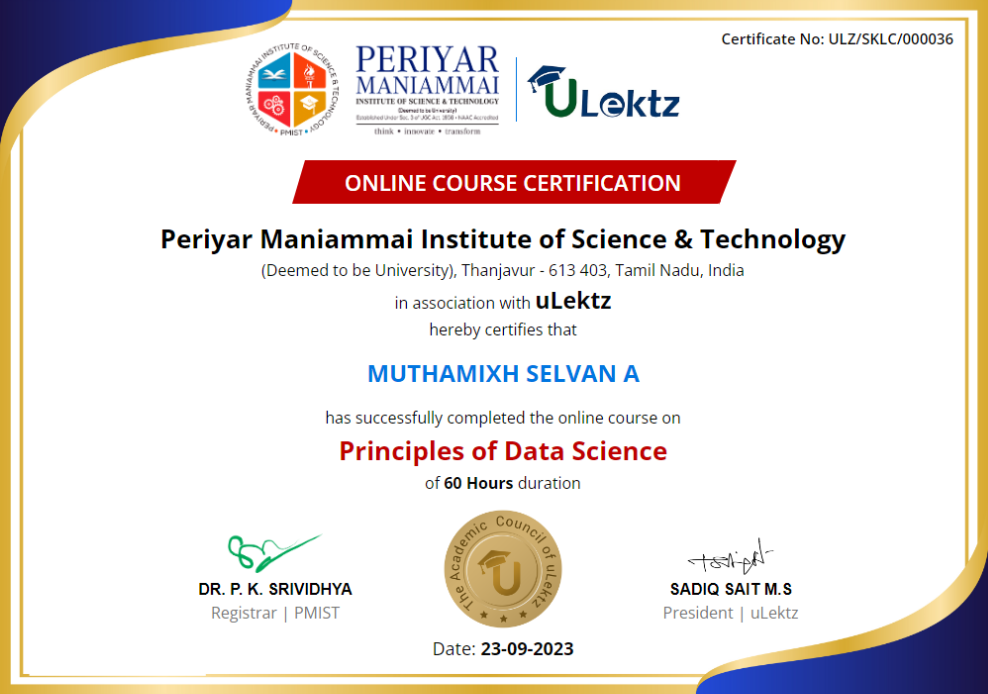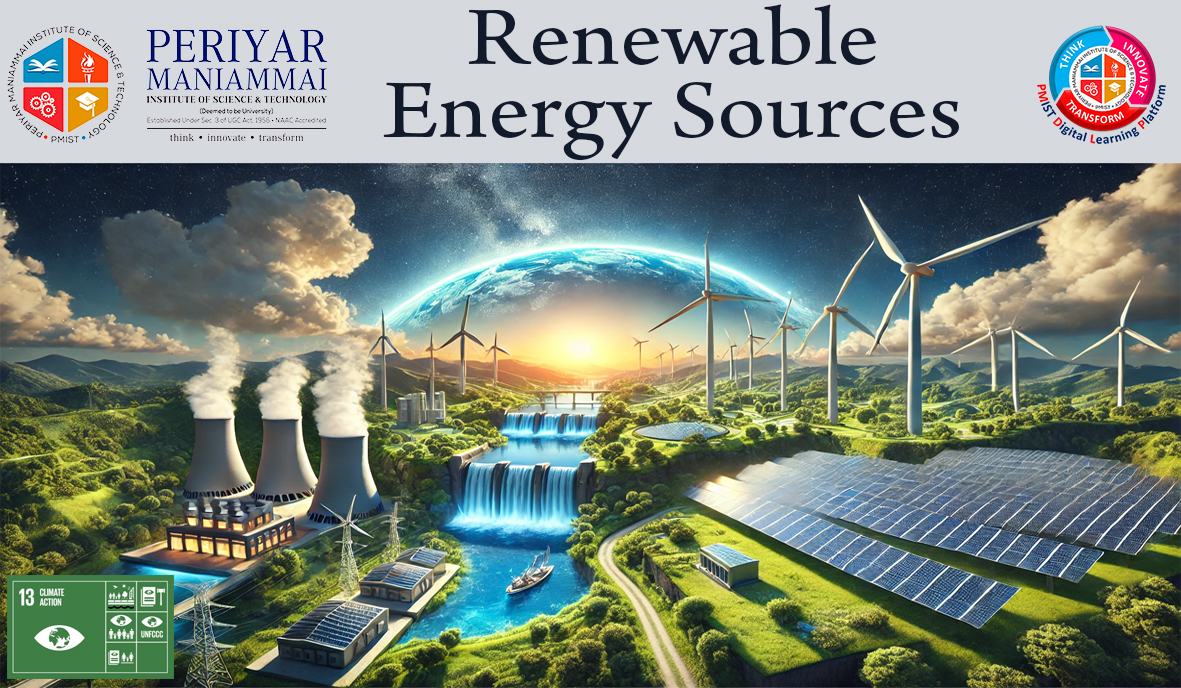

Note: Please check your Spam or Junk folder, in case you didn't receive the email with verification code.
Adaptive:Personalised Learning
Renewable Energy Sources course explores various energy sources, with a focus on renewable energy and its environmental impact. It covers bioenergy, solar, wind, tidal, and geothermal energy, along with their principles, applications, and design aspects. The role of energy conservation, auditing, and management in sustainable energy utilization is also discussed. Emphasis is placed on understanding energy cycles, global energy scenarios, and innovative approaches to harnessing renewable resources.
After successful completion of the course, the learners will be able to
Primary energy sources - world energy resources - Indian energy scenario - energy cycle of the earth –environmental aspects of energy utilization, CO2 emissions and global warming, Carbon cycle – renewable energy resources and their importance. Potential impacts of harnessing the different renewable energy resources.
Energy from bio mass & bio gas plants - various types - design principles of biogas plants - applications. Industrial, municipal and agricultural waste to Energy, Incineration - advantages and limitations – Bio fuels – types, production methods, properties and applications.
Principles of solar energy collection -solar radiation - measurements - instruments - types of collectors - characteristics and design principles of different type of collectors - performance of collectors. Solar thermal applications – water heaters and air heaters - performance and applications - simple calculations - solar cooling - solar drying - solar ponds - solar tower - solar furnace.
Energy from the wind - general theory of windmills - types of windmills - design aspects of horizontal axis windmills - applications. Energy from tides and waves – working principles of tidal plants and ocean thermal energy conversion plants - power from geothermal energy - working principle of geothermal power plants.
Energy Conservation, Energy Audit and Energy Management-Principles and Techniques.
.This module delves into the intricate relationship between energy and the environment, providing a holistic understanding of energy concepts, classifications, sources, and their environmental implications. It explores the global and Indian energy landscapes, examining energy cycles, environmental impacts, and the challenges posed by conventional energy sources. Additionally, it discusses the critical issues of pollution, global warming, and the advantages and limitations of renewable energy sources.
 ENERGY AND ENVIRONMENT
ENERGY AND ENVIRONMENT
 RES - Module 1 - Assessment
20 Questions
RES - Module 1 - Assessment
20 Questions
This module explores biomass as a renewable energy source, covering its resources (agricultural residues, forestry by-products, manure, energy crops, and municipal waste) and conversion methods, including thermochemical (combustion, gasification, pyrolysis) and biochemical (anaerobic digestion, fermentation) processes. It highlights benefits like waste reduction and lower greenhouse gas emissions, showcasing biomass's role in sustainable energy.
 RES - Module - 2 - Bio Energy
RES - Module - 2 - Bio Energy
 RES - Module 2 - Assessment
20 Questions
RES - Module 2 - Assessment
20 Questions
This module provides an in-depth understanding of solar energy collection principles, solar radiation measurement techniques, and various types of solar collectors. It covers the design principles, characteristics, and performance evaluation of different collectors. The module further explores solar thermal applications such as water and air heating, solar cooling, drying, ponds, towers, and furnaces. Additionally, it includes simple performance calculations to enhance practical understanding.
 Module 3 - Solar Energy
Module 3 - Solar Energy
 RES - Module 3 - Assessment
20 Questions
RES - Module 3 - Assessment
20 Questions
This module explores renewable energy sources, focusing on wind, tidal, wave, and geothermal energy. It covers the fundamental principles of wind energy conversion, different types of windmills, and the design aspects of horizontal-axis wind turbines. The module also delves into tidal and wave energy, explaining the working principles of tidal power plants and ocean thermal energy conversion (OTEC) systems. Additionally, it discusses geothermal energy, including its sources and the working principles of geothermal power plants.
 Module 4 - Wind, Tidal and Geothermal Energy
Module 4 - Wind, Tidal and Geothermal Energy
 RES - Module 4 - Assessment
20 Questions
RES - Module 4 - Assessment
20 Questions
This module focuses on the principles and techniques of energy conservation, energy auditing, and energy management. It covers the importance of efficient energy utilization, methods to reduce energy wastage, and strategies for optimizing energy use in various sectors. The module also introduces energy auditing techniques to assess energy consumption patterns and identify areas for improvement. Additionally, it explores energy management principles, policies, and best practices for sustainable energy use.
 Module 5 - Energy Savings and Audit
Module 5 - Energy Savings and Audit
 RES - Module 5 - Assessment
20 Questions
RES - Module 5 - Assessment
20 Questions
 RES - Final Assessment
50 Questions
RES - Final Assessment
50 Questions
The certificate issued for the Course will have
Only the e-certificate will be made available. No Hard copies. The certificates issued by Periyar Maniammai Institute of Science and Technology. can be e-verifiable at www.ulektzskills.com/verify.



 90 hours Learning Content
90 hours Learning Content 100% online Courses
100% online Courses English Language
English Language Certifications
Certifications